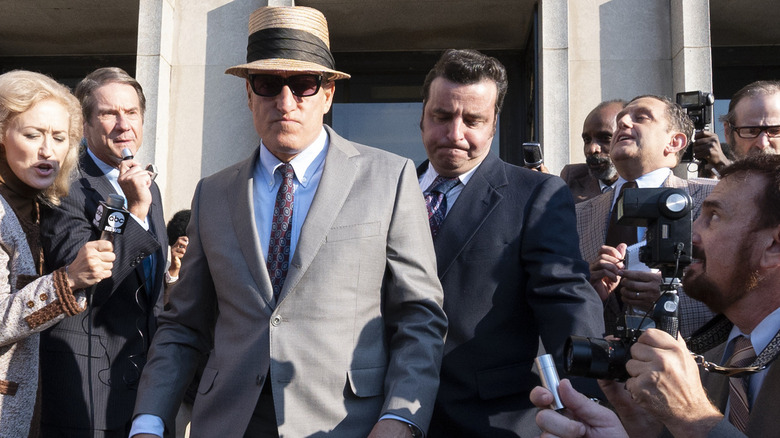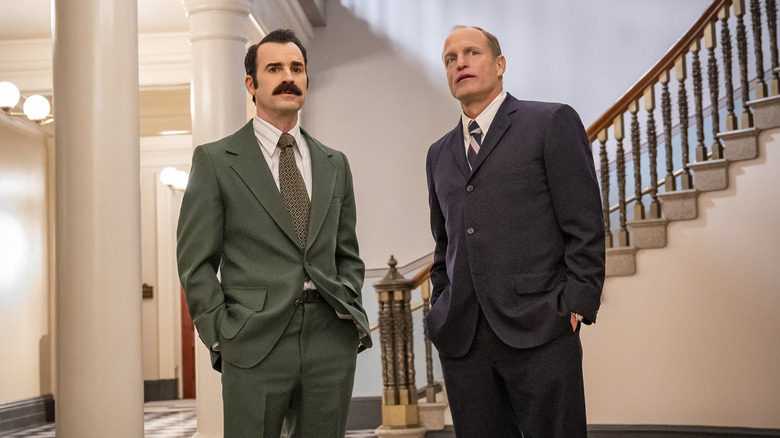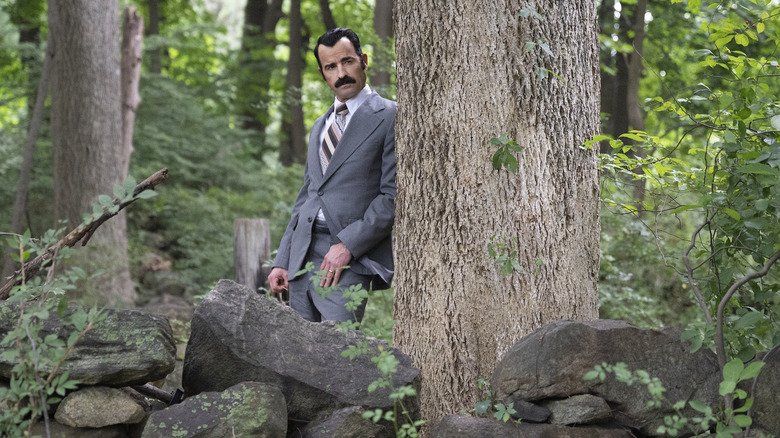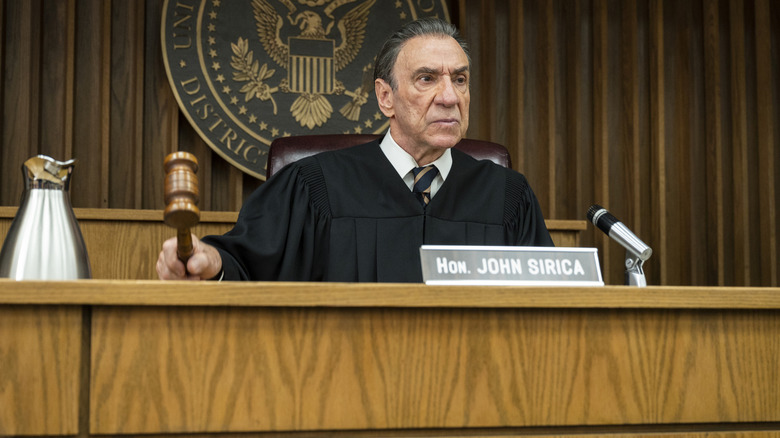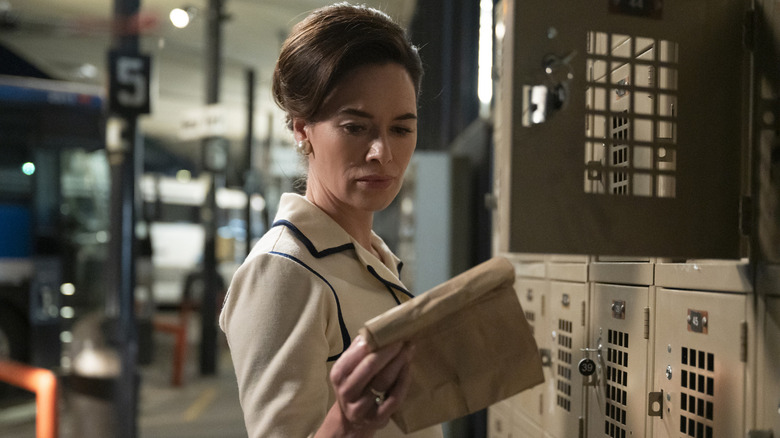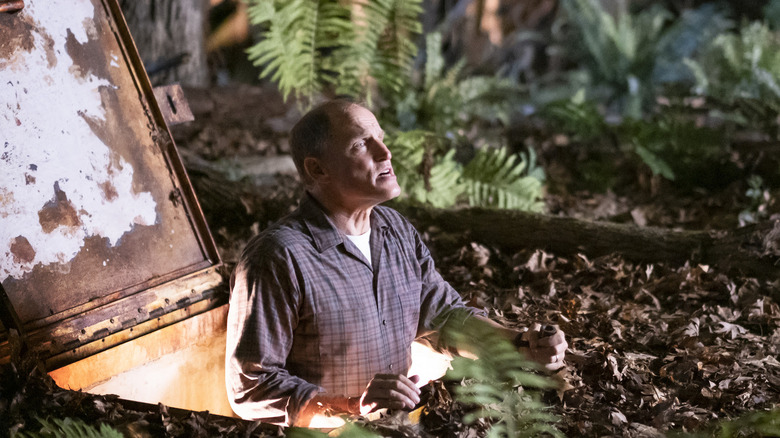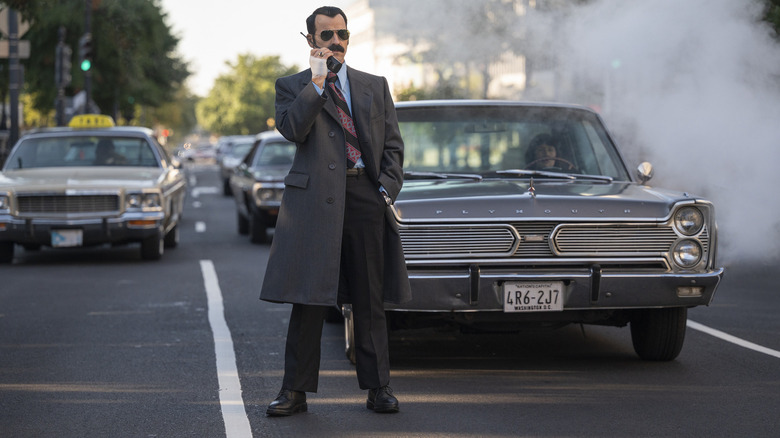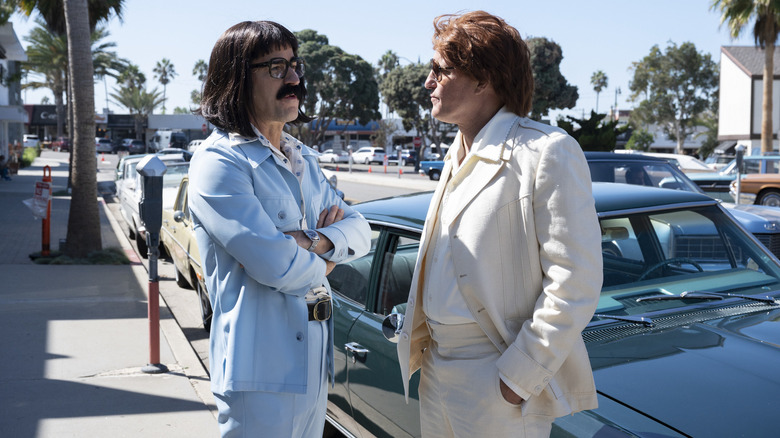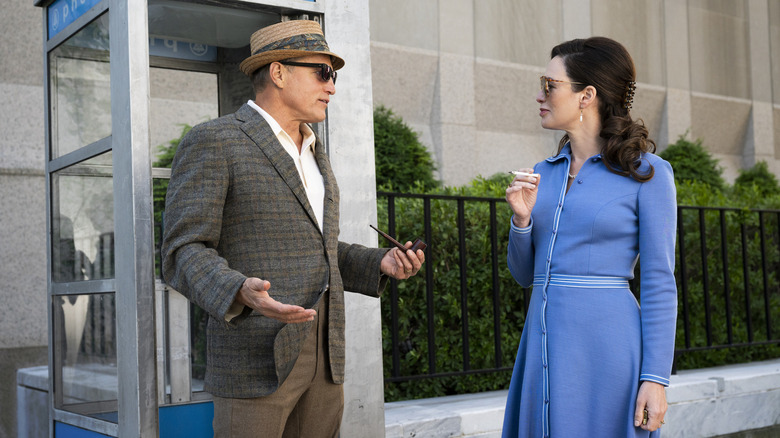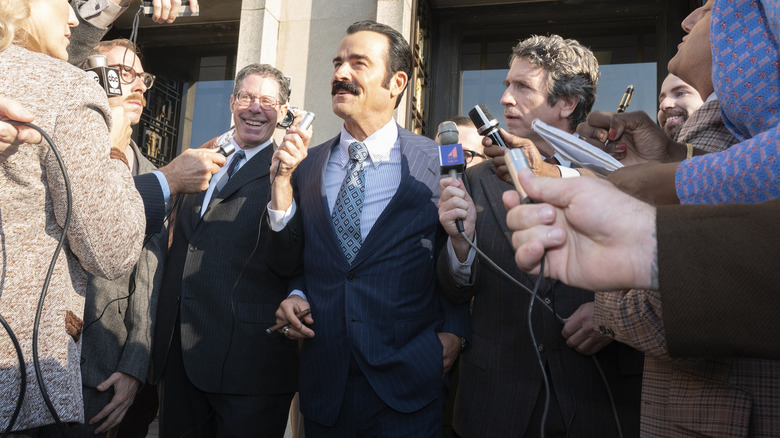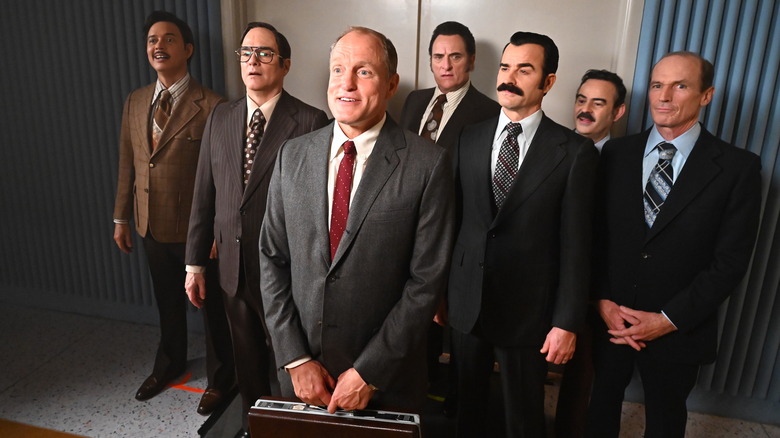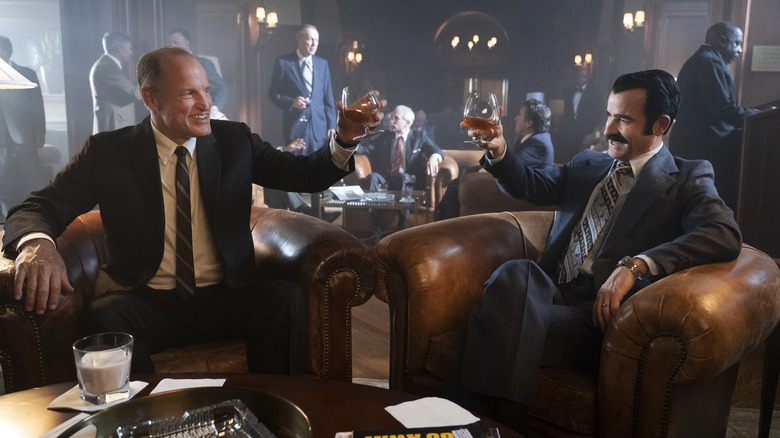The Ending Of White House Plumbers Explained
Contains spoilers for "White House Plumbers"
In the end, an entire presidency was brought down by a cheap piece of tape, carelessly left on the door to a service entrance at the Watergate Hotel. Or perhaps it was really brought down years earlier, when the president decided that the two men best suited to do his dirty work were a has-been CIA agent and a never-was FBI lawyer. The HBO miniseries "White House Plumbers" takes a long, withering look at these two men, E. Howard Hunt (Woody Harrelson) and G. Gordon Liddy (Justin Theroux), whose often-inept actions on behalf of President Richard Nixon turned what should have been an easy reelection in 1972 into one of the most notorious chapters in American history.
Directed by David Mandel and created by writers Alex Gregory and Peter Huyck — all alumni of the political satire "Veep" — the series ends with Hunt and Liddy stuck in prison as the Nixon administration (and perhaps the whole of American democracy along with it) falls to pieces. As in real life, the series has a lot of moving parts, some of which are examined in the harsh light of day and others of which remain shrouded in mystery. Let's take a look at the end of "White House Plumbers," and try to separate fact from fiction.
What you need to remember about the plot of White House Plumbers
The Watergate saga has been investigated in everything from books and films to songs, plays, and podcasts; Half a century later, its odd combination of vast, unknowable conspiracy and absolutely boneheaded maneuvers continues to fascinate. "White House Plumbers" strikes a balance between the dramatic tone of 1976's "All the President's Men" and overt parody like the 1999 comedy "Dick," piling up real-life hijinks and silly wigs in the first half of the series before descending into paranoia and recrimination as the full weight of the Watergate break-in falls on the shoulders of our protagonists.
The series begins with Howard Hunt, a former CIA company man and part-time novelist, being called back into duty by Nixon lackey Egil "Bud" Krough (Rich Sommer) for a special assignment: To discredit Pentagon Papers leaker Daniel Ellsberg by breaking into his psychiatrist's office and finding incriminating (or at least embarrassing) information, where he is partnered with the ever-so-slightly fascist former federal agent G. Gordon Liddy. In the summer of 1972, Hunt, Liddy, and their collaborators are given their biggest assignment yet when they are asked to break into the Democratic National Committee headquarters at the Watergate Hotel and plant listening devices. As the series gleefully depicts, the Watergate break-in was actually four different break-ins: Two false starts, one successful attempt, and then one more time to fix bugs that were misplaced. It was that fourth attempt on June 17 when Watergate security guard Frank Wills (Eddie K. Robinson) discovered tape on the door of a service entrance and called the police for assistance.
What happened at the end of White House Plumbers?
After Hunt and Liddy's collaborators are arrested inside the DNC offices, things quickly spiral out of control. At first, both men remain good soldiers, refusing to cooperate or name names in the belief that the Nixon administration will pardon them if they are convicted. But as the Senate investigation into Watergate heats up, those hopes of a pardon grow dimmer with each new testimony and resignation. Meanwhile, the secret cash payments to Hunt and Liddy, doled out by the White House and coordinated by Hunt's wife Dorothy (Lena Headey), slow to a trickle.
After Dorothy is killed in a plane crash in late 1972, Hunt is at a crossroads. Shamed for his actions by his eldest daughter Kevan (Kiernan Shipka) and watching the possibility of a pardon grow more unlikely by the minute, he reluctantly decides to testify to the Senate in exchange for leniency. His cooperation is too little too late, however, and the best he is offered is a transfer to a minimum security facility. Liddy, on the other hand, remains terrifyingly steadfast in his conviction. He elects to stay in prison rather than cooperate, much to the chagrin of his wife Fran (Judy Greer), and finds the purpose he has always desired by helping his fellow inmates with legal counsel. When Hunt gets the news that Nixon has resigned, rendering his and Liddy's service and sacrifice meaningless, he is ironing shirts in the prison laundry.
What is provisional sentencing?
Hunt and Liddy were found guilty of the Watergate break-in alongside the men who were actually arrested that night: Former CIA agents James McCord (Toby Huss) and Frank Sturgis (Kim Coates), as well as a trio of Cuban operatives (Tony Plana, Nelson Ascencio, and Yul Vazquez) whom Hunt had worked with on the failed 1961 Bay of Pigs invasion. Each of them testified that the break-in was conducted independently, with no orders or input from anyone inside the White House. However, on the day of sentencing, McCord submitted a letter to Judge John Sirica (F. Murray Abraham) stating that he and his fellow defendants had perjured themselves. Correctly assuming that the truth (or at least more of the truth) would come out in the upcoming congressional investigation, Sirica gave Hunt and company provisional sentences of up to 40 years in prison — with the expectation that anyone who cooperated with the investigation would have their sentences reduced.
The series presents this moment more or less how it happened; McCord really did give Sirica his letter the day they were set to be sentenced, and the judge did impose harsh sentences on the burglars in order to compel them to cooperate, an unusual and controversial move at the time.
The mysterious death of Dorothy Hunt
As Dorothy Hunt, "Game of Thrones" star Lena Headey doesn't have much to do for the first three episodes of "White House Plumbers," to the point that audiences might wonder why an actor of her caliber and recognition took on such a small role. But the fourth episode belongs to her. As the fallout from the Watergate break-in sends everyone scrambling in a panic, Dorothy steps up, cool and collected like the former secret agent she is. She serves as an intermediary between the White House and her husband and his collaborators, picking up secret cash drops from airports across the country. But as the cash payments begin to dwindle, Dorothy takes matters into her own hands and arranges an interview with CBS News on a flight to Omaha.
That flight, however, never made it to Omaha: It crashed while attempting to land at Chicago's Midway Airport, killing 40 passengers, including Hunt. Conspiracy theories around the crash sprung up almost immediately. Chicago private investigator Sheldon Skolnick claimed that the crash, despite being ruled an accident by the NTSB, was nothing less than a mob hit on Nixon's enemies — not just Hunt, but also CBS reporter Michele Clark, whom Hunt was allegedly on the flight to speak with, as well as a pair of attorneys tangentially related to the Watergate investigation. "White House Plumbers" takes as fact that Hunt and Clark were flying together on purpose, but otherwise plays coy with the idea that the plane was deliberately taken down.
After Watergate, Hunt returned to the written word
Despite the provisional threat of 30 years in prison, in the end, Hunt served just 32 months before being released in 1977. Hunt was a writer first and foremost, churning out potboiler spy novels both before and during his stint as a CIA spook, often under noms de plume like Robert Dietrich, Gordon Davis, and David St. John (a portmanteau of his sons' names). "White House Plumbers" treats Hunt's literary career as a running joke; No one in his family seems to think much of his work, and his attempt to impress a young flight attendant comes back to bite him once the Watergate plot blows open.
But in real life, titles like "I Came to Kill" and "End of a Stripper" were his life's work as much as anything he did for Nixon, and when he was released from prison — widowed and friendless — the written word was there for him once again. Hunt published nearly two dozen books between his release from prison and his death in 2007, for the first time mostly written under his real name. His final work was a posthumously released memoir, "American Spy," though that might be charitably classified under fiction as well. After Watergate, Hunt settled in Miami and married his second wife Laura. Together they had two sons, Austin and Hollis.
Liddy grabbed the spotlight and never let go
G. Gordon Liddy was a lot of things. In his own mind, he was a patriot and a freedom fighter. To others, however, he was charismatic but unbearably intense, a Nazi sympathizer (more on that later), and an incredible ham. The series depicts him grandstanding to the press, only to not actually say anything, and pretending to fall asleep in court. Liddy loved the spotlight, and after being released from prison in 1977, he grabbed it and never let go, parlaying his Watergate infamy into a number of simultaneous careers. He became a bestselling author, a popular figure on the lecture circuit, a security consultant, and for a while, a pretty successful character actor.
A postscript at the end of the "White House Plumbers" finale mentions his appearance on "Miami Vice," but that wasn't some one-off stint. In the '80s, Liddy appeared on episodes of "Airwolf," "MacGyver," the short-lived HBO adaptation of "Encyclopedia Brown," and in 2000, played the lead villain in the syndicated action drama "18 Wheels of Justice." By then, however, his main gig was as a conservative radio show host. Liddy took to the airwaves in 1992, part of a wave of right-wing pundits including Rush Limbaugh and Michael Reagan that played a crucial role in reshaping the Republican party during the Clinton and George W. Bush eras. "The G Man," as Liddy referred to himself, was on the air for 20 years. He retired in 2012 and died in 2021 at age 90.
In the end, both Hunt and Liddy wrote books about Watergate
In episode 4, as the screws begin to tighten on the Watergate burglars, the Liddys have the Hunts over for dinner one night. Howard and Dorothy use the occasion to propose a way to fight back against the press and perhaps gain leverage over the White House by writing a book telling their side of the story. Liddy is shocked at the proposal. He adamantly refuses to have any part in the idea, and later becomes so concerned that Hunt might move forward with it that he considers having his partner killed.
In real life, however, both men ended up publishing Watergate tell-alls. Hunt's book came out first, while he and Liddy were still serving in federal prison. 1974's "Undercover: Memoirs of an American Spy" capitalized on Hunt's notoriety and the free-floating paranoia that had enveloped America in the wake of Watergate, breathlessly promising the true story of the CIA's actions in Cuba, Guatemala, and at the DNC headquarters. Rather than blurbs on the back cover praising the book, Hunt and his publishers ingeniously used quotes from Nixon's secret recordings in which the former president slammed Hunt for all he knew. Meanwhile, Liddy's contribution to the Watergate canon, the 1980 memoir "Will," was a bestseller and inspired a 1982 TV movie starring Robert Conrad ("Wild Wild West") as Liddy and character actor F.J. O'Neill as Hunt.
Hunt and Liddy's children carried on the family business
The series focuses heavily on the Hunt home life, not just Howard and Dorothy's relationship, but also their children: Eldest daughter Kevan, middle children Lisa (Zoe Levin) and Saint John (Liam James), and pre-teen David (Tre Ryder), who is sent off to live with a mysterious Cuban godfather (Steven Bauer) when Howard goes to prison. Kevan and Saint John both followed in their father's footsteps to become writers. Kevan is the author of two mystery novels set in the Sierra Mountains, while musician Saint John's literary output has focused on his infamous parents and conservative issues. He has co-authored two books with former Nixon lackey Roger Stone.
The five Liddy children are little more than a sight gag in the first episode, lined up on the stairs like the Von Trapp family, but in real life, they too took after their father. Republican attorney Tom Liddy hosted an Arizona-based conservative radio show in the 2000s, and in 2022 came under fire from fellow conservatives when he refused to entertain notions of election tampering from losing candidate Kari Lake. Alexandra Liddy Bourne is also active in politics: As a policy advisor for the Heartland Institute, her focus over the years has been promoting climate change denial. Son Raymond Liddy, meanwhile, served as a deputy attorney general in California before being sentenced to five years probation in 2020 for possession of child pornography.
Was Hunt really involved in the assassination of John F. Kennedy?
There have been many theories over the decades, some wilder than others, about the 1963 assassination of President John F. Kennedy. While the official findings by the Warren Commission were that gunman Lee Harvey Oswald was a lone operative, many amateur sleuths have their doubts. For those who believe that Oswald was either a patsy or a CIA asset, Howard Hunt and fellow Watergate burglar Frank Sturgis have long been people of interest. "White House Plumbers" plants a number of wink-wink references to Hunt's possible involvement, leading up to the postscript in the final episode that reveals that he actually confessed to the assassination on his deathbed. This is a claim that Hunt's sons Saint John and David made in 2007, though others in the family have taken issue with their account.
But the show has another odd connection to the JFK assassination — not related to Hunt, but to the man who plays him. Woody Harrelson's father Charles was a convicted contract killer in Texas who constantly talked up his exploits, both real and imagined, including killing the president in Dallas. The elder Harrelson was suspected of being one of the "three tramps" seen in a cryptic photo taken near Dealey Plaza the morning of the assassination, with the other two possibly being Howard Hunt and Frank Sturgis. Dallas Police Department records from the time confirmed that the "tramps" were nothing but itinerant men taken into custody prior to the president's arrival, but for JFK conspiracy buffs, distrust springs eternal.
Was Liddy really a Nazi aficionado?
G. Gordon Liddy was a very strange man, and the series leans heavily on his mesmerizing eccentricity, whether it involves teaching White House secretaries how to kill a man with a pencil or holding his hand over a candle (and giving himself serious burns) as a show of fortitude. But the strangest quirk of all is his fascination with Nazi Germany. He listens to albums of Hitler's speeches, he peppers his speech with German expressions, and in the final episode when a throng of grateful prison inmates gives Liddy a standing ovation, he responds with an emotional Nazi salute — much to the confusion of the Jewish inmate (comedian Robert Smigel) who started the round of applause in the first place.
While the prison salute might be a bit of satire in the vein of "Dr. Strangelove," the impetus behind it was very much taken from real life. Liddy grew up in a heavily German neighborhood of Hoboken, New Jersey, which in the early-to-mid 1930s was a very pro-Nazi pocket of the country. In a 2004 interview with The Independent, he admitted to finding strength and inspiration in Hitler's oratory and Nazi iconography, claiming that the power of the Führer's words "sent an electric current through my body." Liddy may have disavowed the Third Reich's hateful ideology as an adult and professed to have no anti-Semitic feelings, but it's clear that his admiration for Hitler as a strongman is something that never quite went away.
What has the cast and crew said about the ending?
Being based on a true story, all of the major plot twists of "White House Plumbers" — the break-in and arrests, Dorothy Hunt's death, and Hunt and Liddy's prison sentences — have been a part of the public record for 50 years. The difference between this show and so many others that have dealt with the Watergate investigation is the framing: Not just the moments of "Veep"-like incompetence that nearly destroyed America, but the specific relationship between Hunt and Liddy. At a public screening of the first episode in Washington, D.C., stars Harrelson and Theroux described the series as a "buddy tragedy" featuring two odd ducks whose styles couldn't be more different. "They become good friends," Harrelson said of Hunt and Liddy. "Things get a little unhinged later, though."
For director David Mandel, the power of the Watergate story is in the way that history repeats itself. The series premiered on HBO just a few weeks after Donald Trump became the first president to be indicted on criminal charges — a dubious distinction that many feel should have been Richard Nixon's. "There's a direct line you can draw from Watergate straight to the present," Mandel said. "We don't want to ring that bell too hard, but we want you to hear that ring."
Could there be a Season 2?
The final episode of "White House Plumbers" closes the book on Hunt and Liddy's adventures in counterintelligence. Though the two men lived well into the 21st century, they never had any further business dealings, and according to the finale's postscript, never even spoke to each other again. All that being said, however, is there a possibility of a Season 2? None of the creative team have said anything about a continuation, and HBO billed it as a limited series, which all but guarantees that what we have is all we'll get.
But in the unlikely event of a Season 2, there are a few possibilities as to what we could see. As stated before, both Hunt and Liddy lived for decades after Watergate, so a second season could take a look at their lives after prison, with Liddy riding into the Reagan '80s and Hunt rebuilding his family from the ashes. Or Mandel, Gregory, and Huyck could apply their farcical style to other recent chapters of American history when clandestine White House activities became embarrassingly public. From the Iran-Contra scandal to Whitewater, the lead-up to the War on Terror, and the entirety of the Trump administration, there is no shortage of Executive Branch chicanery to be mined for bitter laughs.
